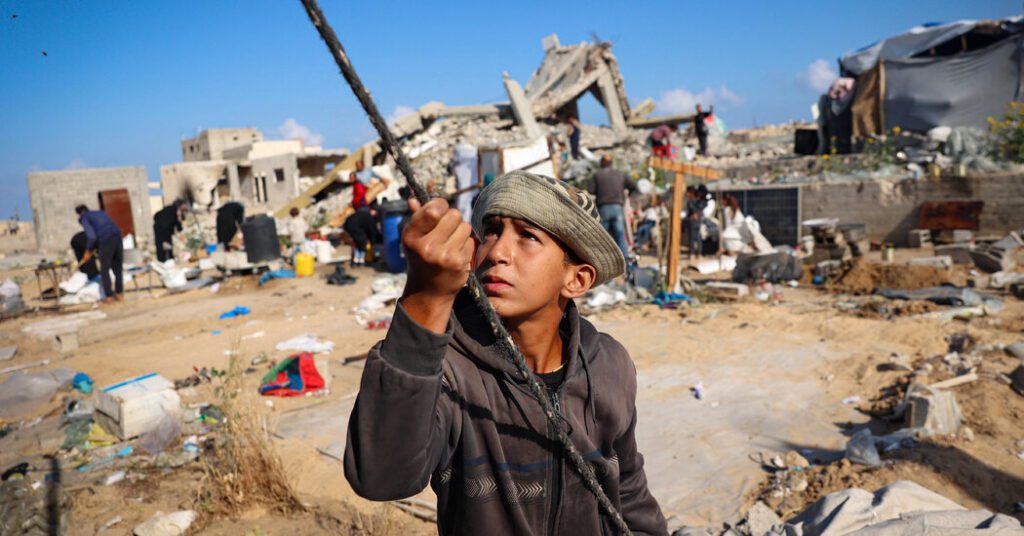Secretary of State Antony J. Blinken warned Wednesday that recent gains in getting desperately needed humanitarian aid to people in the Gaza Strip risk being undone by fighting in southern Gaza.
More than a week after Israel launched what it called a limited military operation against Hamas in the southern city of Rafah, one border crossing vital to aid shipments has been closed and another has been severely restricted. has been done.
“The fact that this active, very active conflict is taking place in Israel at the very time that Israel was taking important and very necessary steps to improve the delivery of humanitarian assistance,” Blinken said. We've seen it have a negative impact.” Located in Rafah district. ”
“We have also seen Hamas firing at the intersection itself, making the situation even more difficult,” he said.
Blinken's comments came as Israel and Egypt exchanged blame over the continued closure of the border between Egypt and Gaza, nearly 10 days after Israeli forces took control of the Gaza side.
Hundreds of Egyptian trucks have been blocked from reaching Gaza, leaving injured and sick Gazans requiring treatment outside the territory, as well as families fleeing the war.
Humanitarian officials say the closure of entry points is exacerbating an already dire aid situation, with soaring prices for many food items and fuel shortages.
Israeli forces have seized control and sealed off the Gaza side of the Rafah border with Egypt as part of a limited military operation against Hamas.
Israel had previously closed another crossing, Kerem Shalom, after a nearby Hamas rocket attack killed four Israeli soldiers, but it has since reopened. Egypt, where most of the aid to Gaza is collected and loaded, is resisting sending trucks to Kerem Shalom, officials said. American and Israeli officials believe that Egypt is trying to pressure Israel to withdraw from Operation Rafah.
Israel accused Egypt of delaying the provision of aid. Egypt has accused Israel of creating dangerous conditions for the transport of aid due to fighting along the border. Heavy shelling and fighting have continued around Rafah since last week.
Israeli Foreign Minister Yisrael Katz said on Tuesday that he had discussed with European foreign ministers the “need to persuade Egypt” to allow “the continued provision of international humanitarian assistance to Gaza.”
“The key to preventing a humanitarian crisis in Gaza now lies in the hands of our friends in Egypt.” He said. He said Israel has no intention of returning the crossing to Hamas control.
Egypt's Foreign Minister Sameh Shoukry quickly pushed back, saying the crossing remains closed because Israel controls it and because Israeli military operations are putting truck drivers and aid workers at risk. He said there was. In a statement from Egypt's Foreign Ministry, Shoukry rejected what he called a “policy of distorting facts.”
Israeli officials rarely criticize Egypt publicly, with which Israel maintains a decades-long peace treaty and cautious security cooperation.
Ignoring international pressure, Israel launched a limited invasion of Rafah on May 6 and occupied the eastern region. Even if trucks are allowed to pass through the Rafah crossing, it is unclear whether they will be able to safely pass through eastern Rafah, where Israeli forces continue to battle Hamas militants.
Israel recently opened two new routes for aid trucks directly into northern Gaza.
“We're also seeing real progress in the North, with more coming in,” Blinken said. “But what we don't want to see is a situation that fundamentally reverses what has happened in recent months.”
The Rafah intersection is not the only difficult area for rescue efforts. Since Israel's invasion of Rafah, only a few trucks have passed through Kerem Shalom, a nearby crossing point between Israel and Gaza. Palestinian workers were evacuated from the intersection before the arrival of Israeli forces, said Wael Abu Omar, a spokesman for the Palestinian side of the intersection.
Two Palestinian officials, who spoke on condition of anonymity to discuss messages between Israel and the Palestinian Authority, said Israel has asked the Palestinian Authority to send personnel to help operate the crossing. That is not the official position.
Officials said the agency's leadership immediately rejected the proposal.
Mahmoud al-Khabash, a religious affairs adviser to President Mahmoud Abbas' government, said Israel must withdraw from the crossing before Palestinian Authority officials take responsibility for its operation.
“How can we work with Israeli tanks there?” he asked in an interview. “This is unacceptable in principle, not to mention the fact that it is dangerous for Palestinians.”
The Palestinian leadership based in Ramallah needs to be reassured that the return of authority to the Rafah border is part of a broader effort to reintegrate the governing body into Gaza, al-Habash said.
“We do not reject the measures that are being taken one after the other, but the Rafah crossing is part of Gaza, the solutions for the Rafah crossing are part of the solutions for Gaza, and the solutions for Gaza are for Gaza. “We need to know that we are part of the solution, the solution for all parts of the Palestinian state,” he said.
Prime Minister Benjamin Netanyahu has largely ruled out the possibility of U.S.-backed authorities returning to Gaza in public statements.
aaron boxerman Contributed to the report.

